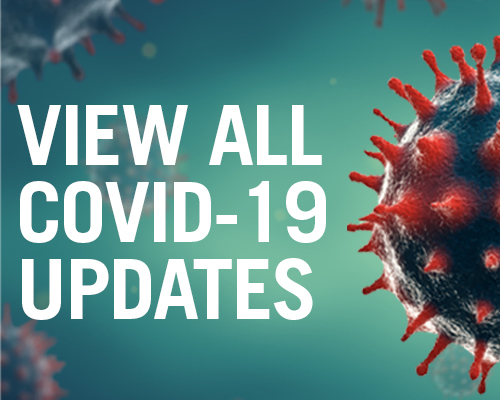Cardiac Considerations Amid COVID-19: Shared Stories May Save Lives
The experience of Chinese physicians is leading the way for others around the world as the pandemic explodes in the US.

As the medical community mobilizes to deal with growing infection rates of COVID-19, physicians are trying to understand how the virus interacts with the cardiovascular system, taking cues from the experience of China and others. A new paper in Circulation illustrates how one group of cardiologists has been documenting what is known and unknown in order to help themselves and their colleagues.
“The impetus was that we were trying to get a good understanding of what is going on—what we as cardiovascular specialists can do, and how we can prepare, as this pandemic is starting to explode in New York,” explained Kevin Clerkin, MD (Columbia University Vagelos College of Physicians and Surgeons, New York, NY). New York City has become the epicenter of COVID-19 in the United States, and Clerkin said the city’s cardiologists are mobilizing to give their colleagues as much feedback from their own experiences as they can.
Much of what is known has come from the efforts of Chinese physicians to document cohorts of COVID-19 patients treated in Wuhan. So far, they have shown that many of the patients treated there had substantial rates of hypertension and CAD. It is unclear, however, if having cardiovascular comorbid conditions poses an independent risk of intubation or death, or whether that risk is mediated by other factors such as age, Clerkin and colleagues say.

While some cardiologists have reported COVID-19 patients presenting with mimickers of STEMI, others are seeing patients with more of a viral myocarditis presentation, or stress cardiomyopathy, Clerkin noted. “As [COVID-19 infection] progresses, we see increased levels of myocardial injury that track with other inflammatory biomarkers, suggesting that this is more of a secondary process. The whole body is in this inflammatory state and the heart is involved, but maybe not predominantly,” he said. “The challenge is that STEMIs will still happen in the midst of this.”
In one study from Wuhan, elevated high-sensitivity troponin or new abnormalities on ECG or echocardiogram were seen in 7.2% of all COVID-19 patients and in 22% of those requiring ICU care.
At the moment, the best advice for teams triaging and caring for these patients is to “be aware that there's going to be a subset, the exact proportion we don't know currently, but there will be a subset that do not actually have an ST-elevation MI, they have COVID-19,” Clerkin said.
Shared Learning in a Troubling Time
In case reports, Chinese physicians have described some COVID-19 patients whose biomarkers and ventricular function normalized with treatment that included intravenous immunoglobulin, steroids, and antiviral therapy. Chinese physicians also have reported subsets of patients presenting with palpitations and chest pain rather than fever and cough.
“Based on available but limited data, it appears that the incidence of fulminant myocarditis and profound cardiogenic shock is low; however, the rate of recovery and mode of treatment are yet to be determined,” Clerkin and colleagues write.
To TCTMD, Clerkin said pooling experiences from COVID-19 patient care will enable physicians to make the best evidence-based treatment decisions. “The Chinese had the most difficult time with this, because they were the first ones to experience it and everything was completely new. We at least have a perspective of what they experienced,” he noted.
#CardioTwitter has exploded with cardiologists sharing COVID-19 experiences, and it is clear from responses that their colleagues are eager to know as many details as possible to inform their own decision-making. Mehrdad Saririan, MD (University of Arizona College of Medicine, Phoenix), shared his team’s experience with STEMI in an advanced COVID-19 patient and was peppered with questions about everything from wall motion to what type of mask he was wearing and whether the procedure was simulated ahead of time.
Our first #COVID19 #STEMI. The team was ready, cool as a cucumber! Anterior tombstones, NSVT, shocky on Levophed, with pristine coronaries. Is this a pattern? #RadialFirst #cardiotwitter #MedEd pic.twitter.com/q5dX2iu5ll
— Mehrdad Saririan (@DrSaririan) March 23, 2020
Another area where shared experience is likely to be important is in heart transplantation. “The ongoing pandemic has raised the question of whether to continue offering heart transplantation due to concerns about a risk for exposure to COVID-19 during hospitalization, as well as challenges in controlling the infection in the context of high levels of immunosuppression,” Clerkin and colleagues write.
Just weeks ago, Chinese physicians described two cases of heart transplant patients presenting with fevers and laboratory and CT scans similar to nonimmunosuppressed individuals with “bilateral ground glass opacities in a peripheral distribution,” Clerkin and colleagues write. The cases were quite different: one had a severe COVID-19 infection, while the other was mild. Both patients survived and were treated with antibiotics and antivirals. Immunosuppression was stopped in the sicker of the two, and a steroid and immunoglobulin strategy was employed.
While shared knowledge is certainly important and needed now, many wonder what will happen to ongoing clinical research efforts and published science during this unprecedented time. In an editorial, Joseph A. Hill, MD, PhD (UT Southwestern Medical Center, Dallas, TX), the editor-in-chief of Circulation, notes that while it is “appropriate and reasonable” to drastically curtail research that does not directly pertain to the COVID-19 outbreak, “halting scientific discovery certainly slows the emergence of lifesaving insights and therapies; as we all are aware, cardiovascular disease remains the #1 killer around the globe.”
Hill maintains that although the virus may impact published science, the challenge will be to ensure that quality wins out.
“Going forward, if a strong and valid paper lacks the one additional experiment that we would ordinarily request, we will face this exceptional circumstance with a considered, respectful, and thoughtful decision process,” he writes.
L.A. McKeown is a Senior Medical Journalist for TCTMD, the Section Editor of CV Team Forum, and Senior Medical…
Read Full BioSources
Clerkin KJ, Fried JA, Raikhelkar J, et al. Coronavirus disease 2019 (COVID-19) and cardiovascular disease. Circulation. 2020;Epub ahead of print.
Hill JA, McGuire DK, de Lemos JA. Science in a time of crisis. Circulation. 2020;Epub ahead of print.
Disclosures
- Clerkin and Hill report no relevant conflicts of interest.


Comments